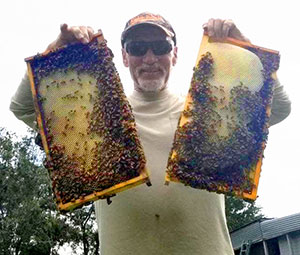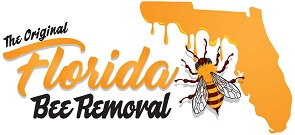
Early this morning, I stepped out into my front yard to enjoy some of the floral scents carried in the cool morning breeze. Clinging vines of ivy bloomed profusely as our red bottlebrush trees presented a huge array of drooping blossoms. The hum of honeybees echoed among the many florets. At the entrance of busy beehives, workers scurried with loads of fresh pollen. Bees depend upon a steady flow of pollen, which provides plant protein for their developing babies.
Central Florida is currently experiencing dry and hot conditions. This has resulted in very high pollen counts– especially from the many species of grasses. Tampa is rated as among the “sneeziest” cities in the U.S. Orlando is also exceedingly “sneezy”. Pollen-producing plants benefit bee colonies, but high pollen counts make life miserable for thousands of humans.
Pollen can be wind-driven up to 400 miles. In view of the effects of high allergen potential, it has been advised that people avoid extensive outdoor activities and keep car windows up. Pollen allergies are among the many environmental elements that may cause our immune systems to react. We are constantly at war with bacteria, viruses, molds, smoke, dust, and fungi, just to pierce the surface of toxins that bombard us dally.
Let’s make a more concerted effort to empower our immune systems. We can formulate our food intake to include vitamins and minerals that promote greater resistance to toxins. Exercise and proper rest increase stamina and organ health. In addition, our living environment must be clean and kept sanitized.
On the negative side, humans have developed the habit of inhaling smoke This has been proven to be detrimental to the cilia-containing cells of our pulmonary system. Continued smoking can also damage sensitive alveoli, which help us remove excess carbon. Serious pulmonary conditions such as cancer, COPD, and asthma complications can be attributed to smoke inhalation.
“Bee” fastidious, like honeybees, which perform their duties in a sanitary hive, working together for the good of their colony.

 Stories From The Hive
Stories From The Hive